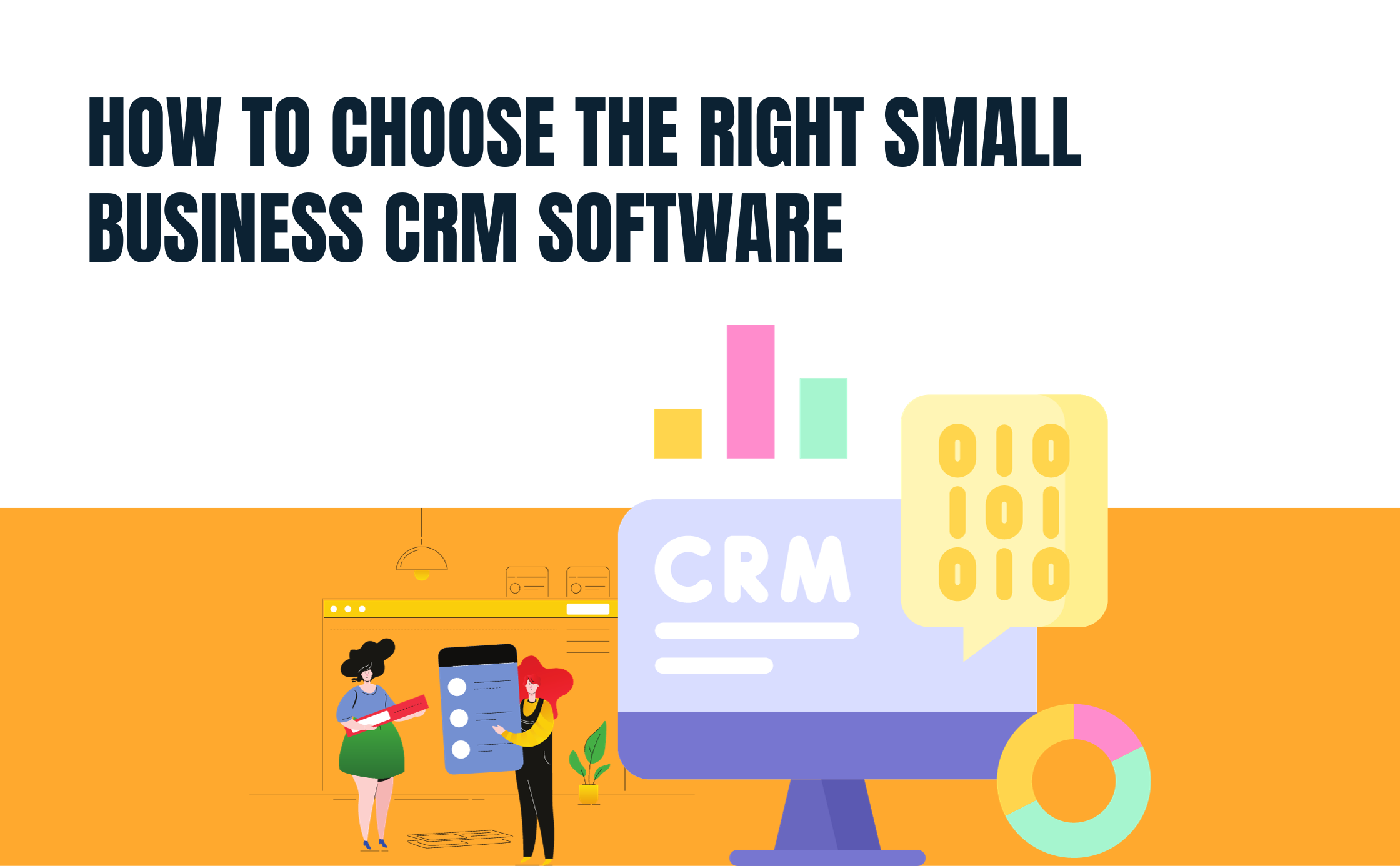Small businesses need CRM software. It helps them manage customer relationships efficiently.
Every small business owner wants to grow. Managing customer interactions is key to this growth. CRM software provides the tools to track sales, customer data, and interactions in one place. This software simplifies complex tasks. It allows businesses to focus on providing excellent service.
With CRM, small businesses can organize their customer information better. This leads to improved customer satisfaction and loyalty. As competition grows, having a CRM system becomes essential. It helps small businesses stay ahead. In this blog, we will explore why CRM software is crucial for small businesses. Let’s dive in.
Importance Of CRM Software
Customer Relationship Management (CRM) software is crucial for small businesses. It helps manage interactions with customers and prospects. This technology enhances customer service, boosts sales, and streamlines business processes. Adopting CRM software can make a small business more efficient and profitable.
Enhancing Customer Relationships
CRM software stores detailed customer information. This includes contact details, purchase history, and preferences. Access to this data helps businesses personalize interactions. It makes customers feel valued and understood. Better relationships lead to repeat business and referrals.
Streamlining Sales Processes
CRM software automates sales tasks. It tracks leads, schedules follow-ups, and generates sales reports. Sales teams can focus on closing deals instead of managing data. This efficiency increases sales and revenue. It also ensures no leads fall through the cracks.

Credit: www.youtube.com
Benefits Of It Solutions
Small businesses often struggle to keep up with the demands of modern operations. This is where IT solutions come in handy. They help in streamlining various aspects of the business and enhancing productivity. Let’s dive into the benefits of IT solutions for small businesses.
Improving Operational Efficiency
IT solutions can greatly improve operational efficiency in small businesses. Automation tools reduce the need for manual work, saving time and effort. This allows employees to focus on more critical tasks, thus boosting productivity.
Consider the use of Customer Relationship Management (CRM) software. It helps in managing customer interactions efficiently. The software can track customer data and preferences, making it easier to provide personalized services. This leads to better customer satisfaction and retention.
Automation tools also help in managing inventory, processing orders, and tracking shipments. This reduces errors and ensures smooth operations. Small businesses can benefit greatly from these tools, making their processes more efficient and reliable.
Ensuring Data Security
Data security is a major concern for small businesses. IT solutions offer various ways to secure sensitive information. Data encryption ensures that data is safe from unauthorized access. Regular updates and security patches keep the systems protected from the latest threats.
CRM software also plays a role in data security. It stores customer information in a secure database, accessible only to authorized personnel. This reduces the risk of data breaches and ensures the privacy of customer information.
Implementing strong passwords and two-factor authentication further enhances security. These measures protect against unauthorized access and keep the business data safe. Small businesses can ensure that their data remains secure, thus maintaining their reputation and customer trust.
Boosting Sales With CRM
Small businesses face many challenges. One of them is boosting sales. Customer Relationship Management (CRM) software can help. CRM can streamline sales processes. It helps businesses track customer interactions and automate follow-ups. Let’s explore how CRM boosts sales.
Tracking Customer Interactions
CRM software helps track every interaction with customers. It stores information such as emails, calls, and meetings. This data is easily accessible. Sales teams can view customer history. They can understand customer needs better. This leads to personalized service and higher sales.
Benefits of Tracking Customer Interactions:
- Better customer understanding
- Improved customer service
- Higher sales conversion rates
- Enhanced customer satisfaction
Automating Follow-ups
Follow-ups are crucial in sales. CRM software can automate this process. It sends reminders for follow-ups. It can also send automated emails. This ensures no customer is forgotten. Timely follow-ups lead to more sales.
Benefits of Automating Follow-Ups:
- Increased efficiency
- Consistent follow-ups
- Higher conversion rates
- Time-saving for sales teams
CRM software is vital for small businesses. It helps track customer interactions and automate follow-ups. These features boost sales. Small businesses can achieve more with CRM.
Customizing Marketing Strategies
Customizing marketing strategies is essential for small businesses. It helps connect with customers and drive growth. CRM software plays a vital role in achieving this. It allows businesses to tailor their marketing efforts. Let’s explore how CRM software helps in customizing marketing strategies.
Segmenting Customer Base
CRM software helps in segmenting the customer base. This means dividing customers into groups based on specific criteria. These criteria can include purchase history, demographics, or behavior. By segmenting customers, businesses can target each group more effectively. This approach makes marketing efforts more efficient and relevant.
Personalizing Campaigns
Personalizing campaigns becomes easier with CRM software. It allows businesses to create tailored messages for different customer segments. This personalization increases the chances of engagement and conversion. Customers feel valued when they receive personalized content. This leads to higher satisfaction and loyalty.
Enhancing Customer Support
Enhancing customer support is vital for small businesses. A CRM (Customer Relationship Management) system can significantly boost this aspect. It helps manage customer interactions, ensuring they receive timely and effective support. By using CRM software, small businesses can streamline their support processes and improve customer satisfaction.
Managing Inquiries Efficiently
CRM software helps manage customer inquiries efficiently. It tracks all customer interactions in one place. This ensures that no inquiry falls through the cracks. Businesses can respond to customer questions faster. The system also allows prioritizing urgent issues. This ensures timely resolution for critical problems.
Providing Consistent Service
Consistency in service is crucial for customer satisfaction. CRM software enables providing consistent service across all customer interactions. It stores detailed customer information. This helps in understanding their preferences and history. Staff can access this information quickly, ensuring consistent and personalized responses.
A CRM system also helps in standardizing responses. It provides templates for common inquiries. This ensures customers receive uniform information. Consistency builds trust and loyalty among customers. It shows that the business is reliable and professional.

Credit: www.predictiveanalyticstoday.com
Integrating It Solutions
Integrating IT Solutions is essential for small businesses in the digital age. It ensures seamless operations and improves productivity. Using Customer Relationship Management (CRM) software is a key part of this integration. CRM software helps in managing customer data, tracking interactions, and automating tasks. It also aids in synchronizing various business operations and facilitating remote work.
Synchronizing Business Operations
CRM software plays a pivotal role in synchronizing business operations. It consolidates customer data from various sources into one platform. This centralization helps in providing a unified view of customer interactions. Employees can access up-to-date information quickly, leading to better decision-making.
CRM systems automate repetitive tasks, such as sending follow-up emails and updating customer records. This automation reduces manual work, saving time and minimizing errors. It ensures that all departments, from sales to customer service, are on the same page.
Here are some benefits of synchronized operations:
- Improved communication between teams
- Faster response times
- Consistent customer experience
- Better data accuracy
Facilitating Remote Work
The importance of facilitating remote work has grown in recent times. CRM software supports this by providing cloud-based solutions. Employees can access the CRM system from anywhere with an internet connection. This flexibility is crucial for maintaining productivity outside the office.
Remote work capabilities include:
- Secure access to customer data
- Real-time updates on sales and support activities
- Collaboration tools for team communication
- Integration with other remote work tools
These features ensure that remote teams can work as efficiently as in-office teams. It allows small businesses to adapt to changing work environments without compromising on service quality.
Cost-effective Solutions
Investing in CRM software can be a game-changer for small businesses. It’s not just about managing customer relationships. It’s also about saving money and boosting profits. Let’s explore how CRM software provides cost-effective solutions.
Reducing Operational Costs
CRM software helps small businesses reduce operational costs. It automates many tasks, reducing the need for manual labor. This means you can do more with fewer employees. Automation also reduces errors, saving money on corrections.
Here’s how CRM software can cut costs:
- Automated data entry
- Streamlined communication
- Efficient task management
Consider the following table showing potential savings:
| Task | Manual Cost | Automated Cost |
|---|---|---|
| Data Entry | $500/month | $100/month |
| Communication | $300/month | $50/month |
| Task Management | $400/month | $80/month |
Maximizing Return On Investment
CRM software also helps in maximizing return on investment (ROI). By providing valuable insights, it helps in making informed decisions. This leads to better strategies and improved sales. Enhanced customer satisfaction also plays a crucial role.
Benefits of using CRM for ROI:
- Better customer segmentation
- Improved sales forecasting
- Personalized marketing campaigns
These features enhance customer loyalty. Happy customers often become repeat buyers. This boosts overall revenue, further maximizing ROI.

Credit: townsquareinteractive.com
Choosing The Right Crm And It Solutions
Choosing the right CRM and IT solutions is crucial for small businesses. With many options available, it can be overwhelming. The right choice can streamline processes, improve customer relations, and boost efficiency. Let’s dive into some key factors to consider.
Evaluating Business Needs
First, identify the specific needs of your business. What are your pain points? Do you need better customer tracking? Or maybe streamlined communication? Understanding these needs helps in selecting the right CRM software.
Consider the daily operations of your business. What tasks take up the most time? What processes need automation? Answering these questions is essential. It ensures you choose a CRM that fits your business like a glove.
Considering Scalability
Think about the future growth of your business. Will the CRM software grow with you? Scalability is vital. You don’t want to switch systems as your business expands.
Look for a CRM that can handle more users, data, and features over time. This saves you from future headaches. A scalable solution means you can focus on growth, not tech issues.
Frequently Asked Questions
What Is Crm Software?
CRM software helps businesses manage customer interactions and data. It centralizes information, improves communication, and enhances customer relationships.
Why Do Small Businesses Need Crm Software?
CRM software helps small businesses streamline operations, improve customer service, and increase sales. It provides valuable insights and automates tasks.
How Does Crm Software Improve Customer Relationships?
CRM software tracks customer interactions and preferences. It enables personalized communication, which strengthens customer relationships and boosts loyalty.
Can Crm Software Save Time For Small Businesses?
Yes, CRM software automates repetitive tasks. It reduces manual data entry, freeing up time for more important activities.
Conclusion
A small business needs CRM software for better customer management. It boosts efficiency and saves time. CRM tools help track customer interactions. This enhances relationships and improves sales. With organized data, decision-making becomes easier. Small businesses can grow faster with CRM’s support.
Investing in CRM is essential for future success. So, consider CRM to streamline your business operations. Make your customer service more effective. Your business deserves the best tools to thrive.




